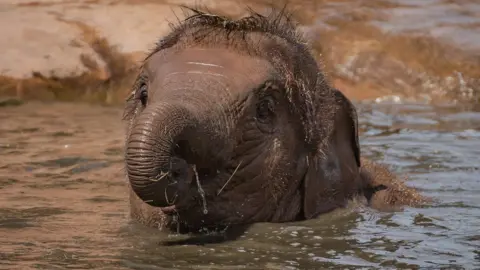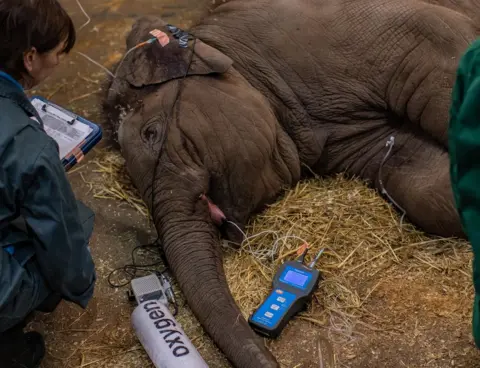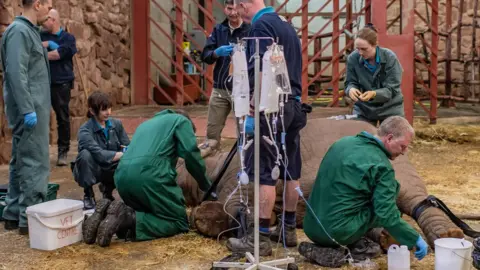Chester Zoo elephant calf's EEHV survival 'momentous'
 Chester Zoo
Chester ZooAn Asian elephant's rare recovery from a "lethal" virus has been hailed as a "momentous step" for the species.
Two-year-old Indali Hi Way is believed to have made a full recovery from elephant endotheliotropic herpesvirus (EEHV), a Chester Zoo spokesman said.
He said groundbreaking work by the zoo, the Animal and Plant Health Agency (APHA) and University of Surrey (UoS), had aided the calf's recovery.
UoS's Prof Falko Steinbach said it would help "find answers" to the virus.
Almost all Asian elephants carry the virus, but it only develops into an illness for some and there is no vaccination against it.
Two Asian elephants died of EEHV at Chester Zoo in 2018.
 Chester Zoo
Chester ZooProf Steinbach, from the university's School of Veterinary Medicine, said a lot "remains unknown about EEHV [but] with fewer than 50,000 Asian elephants left in the wild, it is important that we find answers".
"Indali's recovery is wonderful news, and we will use what we have learnt from her case to help us find solutions against this deadly virus," he added.
Vets at the zoo diagnosed the calf with the active virus in March and set about a programme of intensive treatment.
Across a two-week period, Indali had nine anaesthetic procedures, blood plasma transfusions, interferon therapy, anti-viral medications and immune boosting treatments, as well as very large amounts of intravenous fluids.
 Chester Zoo
Chester ZooThe zoo's chief executive Dr Mark Pilgrim said the two-year-old's recovery was a "major milestone for conservation".
"Only two years ago, the global search for a solution to the EEHV crisis looked unlikely to bear fruit," he said, adding: "There is light at the end of the tunnel."
Dr Akbar Dastjerdi, the head of APHA's Mammalian Virus Investigation Unit, said the treatment was the first step towards a cure.
"With the help of many devoted scholars, we have been able to develop a way to tackle EEHV," he said.
"Our efforts are now focused on designing and testing a vaccine to save this irreplaceable species from further suffering."
